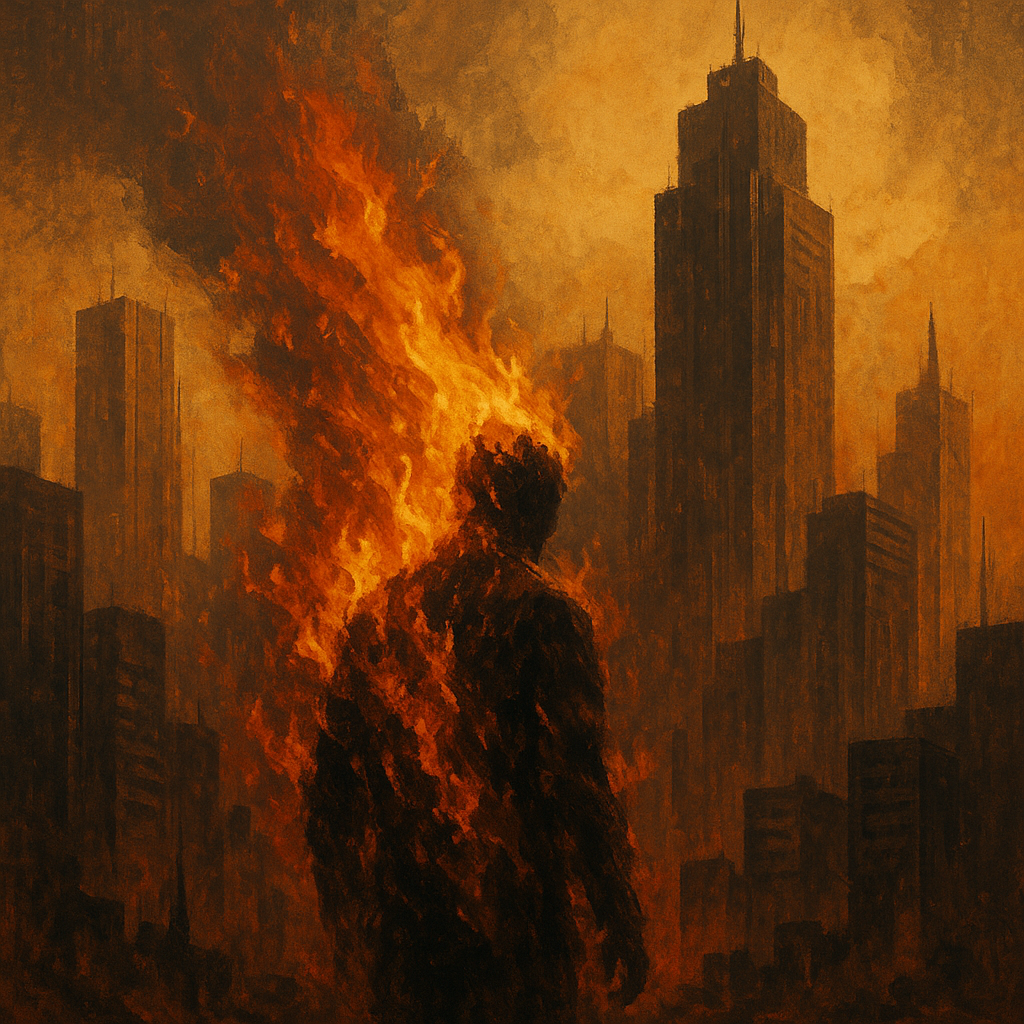How to Stop the Antichrist: A City for the Edge in an Age of Stagnation

Stagnation Is the Root
Peter Thiel is right: our world has stopped building.
Economic growth has slowed.
Scientific breakthroughs have dwindled.
Political systems have ossified into stale, reactive machines.
We are stuck in what Thiel calls “secular stagnation”—a world that promised flying cars but delivered social media arguments.
But this isn’t just a technical failure.
It’s deeper.
It’s spiritual.
In a world without new frontiers, energy turns inward.
Hope gives way to rivalry.
And when growth halts, a deadly cycle begins:
We turn on each other.
This isn’t just conflict.
It’s the loss of direction that comes before collapse.
When Progress Stops, Seekers Burn
In times of expansion, societies celebrate their edge-pushers:
Inventors.
Explorers.
Risk-takers.
These are the pioneers—what we now call Seekers: individuals drawn to ambiguity, novelty, and rebellion against repetition. They are wired for frontier thinking.
But in a stagnant world, these same people become inconvenient.
Disruptive.
Dangerous.
Their traits—hyperactivity, impulsivity, chaotic focus—stop looking like gifts.
They are labeled as disorders.
Think of ADHD. Evolution prepared these minds for discovery, not maintenance. They are built for rapid adaptation, for stimulation and flow.
But when there’s nothing left to discover?
We suppress them.
We label them.
We medicate them.
ADHD is just one expression.
There are countless Seekers—neurodivergent or not—who don’t fit the standard mold.
And in systems that fear change, they all face the same fate.
Scapegoating Is What Stagnation Does to a Soul
René Girard’s theory of mimetic desire explains what happens next.
As people imitate one another in a world of shrinking opportunities, rivalries intensify.
Without a shared mission to bind us, we turn on each other.
To restore temporary peace, societies find a scapegoat:
Someone to blame.
To punish.
To expel.
Girard believed scapegoating was the foundation of civilization.
But here, we revise him:
Scapegoating is not the origin of society.
It’s the emergency response of a society that has stopped evolving.
And who gets scapegoated first?
The Seekers.
The strange ones.
The ones who refuse to conform.
History repeats this pattern:
- Socrates was condemned by a decaying Athens.
- Jesus was executed by an empire threatened by disruption.
- Galileo was silenced for challenging dogma.
- Alan Turing was persecuted after saving his nation.
Innovators, prophets, and edge-pushers are always the first to burn.
They are sacrificed because they cannot be domesticated.
AI: A Temporary Frontier
Right now, AI delays collapse.
It offers a fragile, temporary space where Seekers can explore, invent, and disrupt.
It is chaotic.
Controversial.
Still open.
But it won’t last.
Like every past frontier—land, industry, internet—AI will consolidate.
Giants will monopolize.
Regulators will arrive.
Creativity will give way to compliance.
And when that happens: where will this energy go?
Not just the energy of Seekers, but also the careful hands of Sustainers and the bridge-building vision of Shapers?
A City That Breathes: Building for Balance
The answer isn’t to wait for the next big thing.
It’s to build a permanent home for life’s core energies—
a city designed not for one type of mind, but for all:
Seekers, Shapers, and Sustainers.
In every dying civilization, imbalance is what kills.
Too many Seekers and society burns in chaos.
Too many Sustainers and it calcifies into stone.
Too many Shapers spinning their wheels, and nothing truly lives.
But balance isn’t stillness.
It’s motion.
A living pulse between exploration, creation, and preservation.
This city exists to hold that pulse.
Core Principles
1. Role Diversity by Design
The city thrives by honoring its triad:
- Seekers – explorers, edge-pushers, minds hungry for the unknown.
- Shapers – translators, architects, builders of bridges between chaos and order.
- Sustainers – stewards, protectors, tenders of continuity and care.
Each role contributes its genius. Each tempers the others’ excesses. No one dominates.
2. Districts of Energy
- Seeker Districts
Open zones for experimentation. Chaos tolerated. Failure metabolized.
Here, novelty is sacred. - Shaper Hubs
Collaborative spaces where sparks are refined into systems, tools, and culture.
Here, wildness finds form. - Sustainer Cores
Stable, quiet environments for grounding. Routines are not prisons—they’re roots.
Here, life is maintained and deepened.
These aren’t silos—they’re currents. Energy flows between them.
3. Dynamic Governance
There are no static hierarchies. Councils are balanced: Seekers dream, Sustainers anchor, and Shapers mediate.
Shapers act as translators, ensuring change doesn’t destabilize and stability doesn’t suffocate.
4. Cultural Cycles
The city breathes in seasons:
- Bursts of innovation (Seeker energy).
- Phases of refinement (Shaper energy).
- Periods of consolidation (Sustainer energy).
Freezing it in one phase would kill it.
5. The Membrane Against Stagnation
The greatest threat is not chaos—it’s optimization into normalcy.
The city must stay unfinished, adaptive, alive.
This is not a startup hub.
Not a technocrat’s playground.
Not a retreat for the neurodivergent.
It’s a civilizational prototype:
A place where difference is designed for, not suppressed.
Where Seekers aren’t scapegoated, and Sustainers aren’t smothered by endless novelty.
A system where chaos is not feared and order is not worshiped—both are sanctified.
A city that breathes.
The Antichrist Doesn’t Destroy—He Pacifies
Girard warned: without scapegoats, society risks descent into apocalyptic violence.
Christianity offered a new path:
Forgiveness.
Nonviolence.
Love of the enemy.
Christ exposed the scapegoat mechanism as a lie.
But the danger remains.
The Antichrist does not emerge in chaos, but in contraction.
He comes not as a destroyer, but as a pacifier.
In Girardian terms, he restores unity through sacrifice.
In theological terms, he counterfeits Christ—not by opposing the crucifixion, but by reversing its meaning.
Where Christ ended scapegoating, the Antichrist enshrines it.
In an age without frontiers, that promise becomes irresistible.
Stagnation breeds a hunger for control.
The Antichrist satisfies it—with silence, order, and the death of the outlier.
He weaponizes fear.
He speaks of Armageddon not to prevent it, but to consolidate power.
Nuclear war, AI doom, environmental collapse—these become tools of spiritual leverage.
The promise is survival.
The price is autonomy.
This is not prophecy.
It’s policy.
It’s already happening.
Sanctify the Edge Before It Burns
This city is not just a social experiment.
It is a spiritual structure:
- A refusal to sacrifice the outlier.
- A container for chaos that turns it into creation.
- A civilizational refusal to kill the prophet to preserve the machine.
We don’t need another temporary frontier.
We need a place that makes difference livable.
Build the City
Not for comfort.
Not for control.
But because the alternative is worse:
a world where every role burns out or ossifies.
This city is not static.
It is alive.
It breathes.
It evolves.
Build it.
Before the next scapegoat burns.
Before the next prophet is crushed under policy.
Before we sacrifice our future to preserve our fear.
The edge must not be silenced.
It must be sanctified.

Discussion